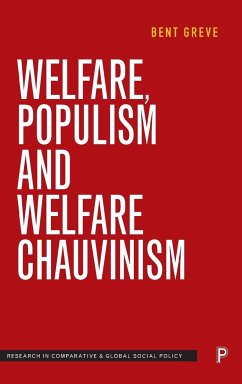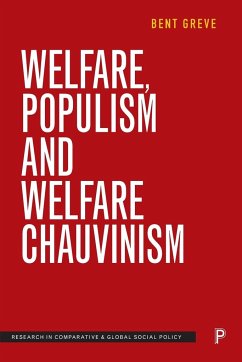
Welfare chauvinism in radical right-wing populist parties. The reframing of the Sverigedemokraterna as "true" social democrats

PAYBACK Punkte
0 °P sammeln!
Studienarbeit aus dem Jahr 2017 im Fachbereich Politik - Thema: Frieden und Konflikte, Sicherheit, Note: 1,0, Ludwig-Maximilians-Universität München (GSI), Veranstaltung: Populist Parties and Anti-Establishment Politics across Europe, Sprache: Deutsch, Abstract: It will be the aim of this written assignment to work out the reasons for the changed political landscape in Sweden, namely the success of the Sverigedemokraterna (SD) and to show, how welfare chauvinism as strategy of the SD helped to establish this radical right-wing party as electable alternative to the established parties. This w...
Studienarbeit aus dem Jahr 2017 im Fachbereich Politik - Thema: Frieden und Konflikte, Sicherheit, Note: 1,0, Ludwig-Maximilians-Universität München (GSI), Veranstaltung: Populist Parties and Anti-Establishment Politics across Europe, Sprache: Deutsch, Abstract: It will be the aim of this written assignment to work out the reasons for the changed political landscape in Sweden, namely the success of the Sverigedemokraterna (SD) and to show, how welfare chauvinism as strategy of the SD helped to establish this radical right-wing party as electable alternative to the established parties. This will be the question, this work will answer: Does the SD owe their electoral success to the introduction of a social agenda, based on the concept of folkhem (the people's home or Volksheim) to use welfare chauvinism to reach a broader electorate?To answer this question, first, there will be an examination of the concepts of populism, radical right-wing populism, welfare chauvinism and a short description of the SD in Sweden. Then, several possible reasons for the electoral success of the SD will be checked, namely the financial crisis of 2008 and its social impacts, the new social narrative of the SD, focusing the concept of welfare chauvinism, anti-establishment discourses in Sweden and the salience of sociocultural elements like immigration, islamophobia and xenophobia. After this, the results will get concluded and added with a short outlook to further research.In the political science debates dealing with populism, the question of the rise of the right-wing populism is linked with the question whether this is owed the failure of conservative parties or the social democracy in Europe. Due to the thesis of this work, that welfare chauvinism is the main reason for the success of the SD in Sweden, it will focus more the failure of the Sveriges socialdemokratiska arbetareparti (SAP) to maintain its traditional core electorate, which led to the raise of the SD. The socialrelevance of this work lies on its dealing with the question of why radical right-wing populism is arising even in established and economically stable democratic welfare-states and how established parties has to deal with this.













